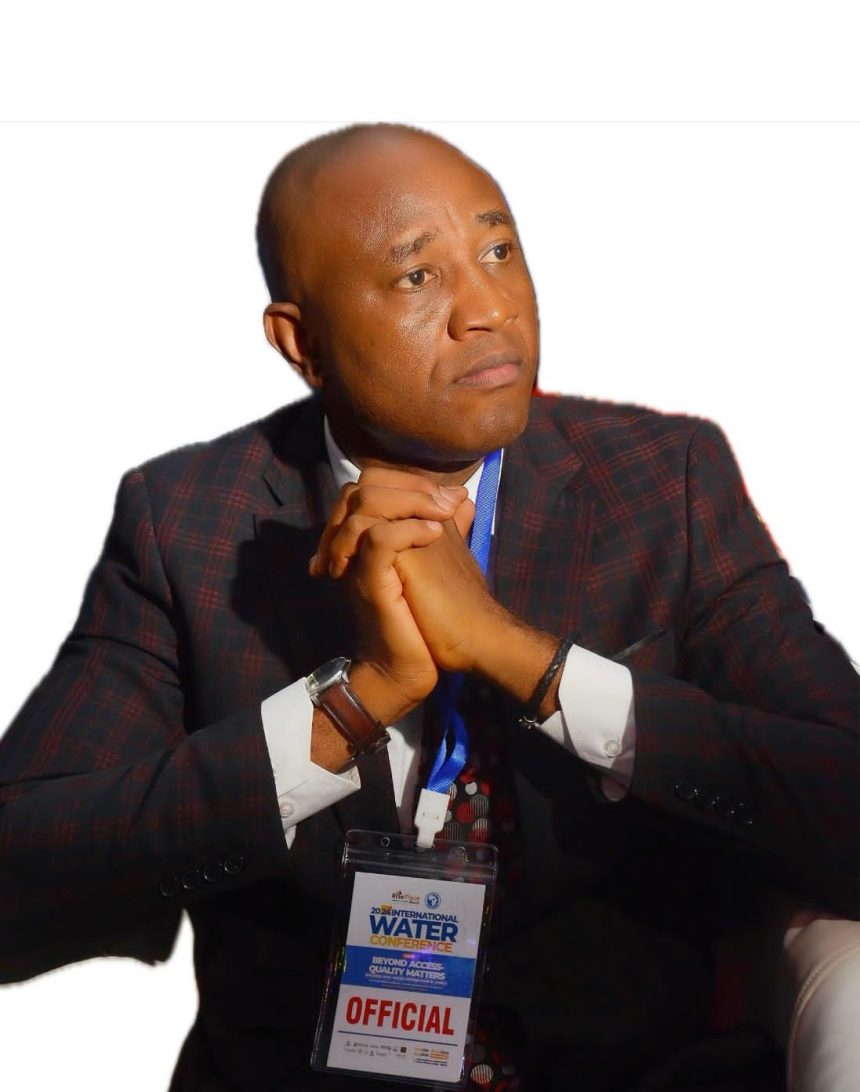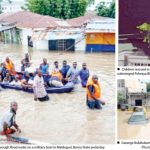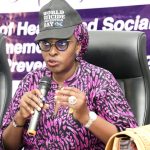By Ekuson Nw’Ogbunka
Abuja
The President/Chief Executive of Right Place Health (RPH), a Non Governmental Organization (NGO), that advocates for water quality in Nigeria and Africa in general, Chukwumezie Okolo (PhD) has called for curbing water born diseases to the barest minimum, by enhancing the quality of water consumed in Nigeria and other African countries.
Okolo made the call at a recent pre – event press briefing he organized in Abuja, the Federal Capital Territory (FCT), with the title: Beyond Access, Quality Matters (BAQM).
Wondering who doesn’t know that the quality of water consumed in Nigeria, can’t always be guaranteed, he said over the years, they have spoken on the need for access to water, adding that often times, quality was assumed and subsumed in that discussion. While noting that access to water is a function of many factors, including the quantity produced, distributed and number of end user served, Okolo however added that discussions on Access haven’t necessarily included quality metrics, and assuming that access guarantees quality is an error.
“So we deliberately and intentionally chose to take the conversation beyond access, because without Quality, Access to Water leads to Waterborne Diseases, such as Cholera, Diarrhea, Typhoid, etc. By deliberately and intentionally checking for and demanding quality measures, we rule out assumptions and then we are more objective about quality
assessment within the water production, distribution and consumption spaces.This is public health in action.
“There can’t be a neglected tropical disease without a neglected tropical people. Most neglected tropical diseases are waterborne, water related, or water associated. Each time we talk about diseases, we must think about humanity, our neighbors, our families, our loved ones. NTDs refer to our own neglected African People, who didn’t choose, yet were born just like we were, in tropical Africa. Unlike the rest of us, they live and deal with diseases they did not choose and diseases they do not want, and which they cannot overcome by themselves.
“Nobody chooses to live with a disease he can eliminate given the resources available to him within his environment. NTDs remind us that some of our people are neglected, especially the poor, even in their disease states and the rest of
us including our governments, as the rest of the world carry-on with life as though all is well. Because we and our
immediate family members are not directly affected, we don’t remember those who are afflicted. Think about
communities dealing with guinea worm for example and how it is their fault,” he wondered.
Raising a question on what we have done lately against such a plaque, the pharmacist cum health and water expert had this to say: “If there be anything we can but have not done to eliminate such flukes, we are guilty of latent ‘neglect’. Primary Health Care (PHC), as the name goes, is the first level of care, closest to the people, and the first port of call for healthcare in the community, providing public health services.
“They are saddled with the responsibility of healthcare with respect to promotive, protective, preventive, curative, rehabilitative, and palliative services within the community they are meant to serve, by addressing their needs and helping them live normal and healthy lives. To guarantee better health outcomes in the PHC, water is mandatory. Again, the quality of water needed to carry out, primary healthcare services has to be guaranteed to avoid all manner of
infections.”
“He continued: “Do you know that most of our PHC centers across the country don’t have access to water, let alone
clean water? We have been talking about access, yet staff fetch water from their homes to go to work in PHC. This is where our children’s vaccinations are given, antenatal services are provided, babies are born, all manner of
perinatal health activities happen. PHC is where we all should go for routine health checks. If they don’thave
water, do we wonder why perinatal complications, infections and deaths are on the increase?
“Are you surprised that infant and under- five mortalities are worst in Africa? Do you see how provision of clean quality water can strengthen that health system and make it more functional and more effective in the discharge of duties?.
Rite Place Health Initiative is an NGO on a mission to address the aforementioned public health problems. Our vision is, Africa where nobody suffers from waterborne diseases, neglected tropical diseases and
where primary healthcare functions optimally in a way that delivers in its mandates to the people as it responds
to their needs. Our strategy is captured in our mission. We consider clean water a fundamental human right. To ask for all of Africa to have access to clean quality drinking water is not asking for too much.”
To advocate for primary health centers and have clean quality water, according to the NGO president, is basic and shouldn’t be seen as daring, if humanity is cared for, just as he called on philanthropists, elected officials, governments and development partners to prioritize water quality in their budgets, saying that it is asking for the obvious. While reiterating that at RPH, that is what they are asking, the water expert noted with dismay that people die daily from all manner of water related diseases and illnesses, both communicable and non-communicable ones, especially women and children.
He observed: “The infant mortality and under – five mortality statistics from Africa are shameful and the undocumented and unreported statistics from all causes are also high. No thanks to dirty drinking water. We will intensify efforts to collect data that will reveal true statistics on latent water related mortalities, and morbidities but our hypothesis is that the statistics will be worse than what is being reported officially so far. The problems associated with water quality in Africa are enormous and the efforts to address and to continuously enforce quality in water distribution in Africa do not match the need and the tendency to disregard standards among those who produce, package and distribute drinking water. Part of the problem has been the fallacy inherent in the assumption that quality is a given when we talk about access.”
On the press release’s title, he had this to say: “BAQM calls our attention to this public health emergency, if indeed we are serious about eliminating waterborne diseases like cholera. It pulls together private and private sectors, researchers and academicians, financial institutions, humanitarian services, environmental services and water engineers, including the general public to the discussion table.
“Water is everybody’s daily food so we believe water quality should be everybody’s business. A subject which affects the life and wellbeing of everybody should be the central concern of everybody, so we invite everybody who can attend to attend. That is why we decided to make registration free but we require pre-registration so we can plan accordingly.”
He stated: “We must have an idea of
numbers to deliver a conference that not only meets but also caters to your needs while the conference lasts.
Without a prior notice we can’t plan well. Two significant things that will happen at the end of the conference are the inauguration of our volunteers, to be known as Beyond Access Ambassadors and the birth of our magazine, to be named, Beyond Access Quarterly Magazine.These simultaneous
development are key to the overall success of the initiative beyond the conference.
“While the Ambassadors will be our grass root representatives identifying and reporting incubators and distributors of waterborne diseases in the communities, as well as identifying cases of waterborne diseases at the local communities that would otherwise go unnoticed and unreported, the Quarterly magazine will be our publication to showcase what bad and good look like; what we are doing in the field to address concerns with waterborne diseases and neglected tropical diseases, as well as intervention aimed at strengthening primary healthcare. These interventions will be supervised and monitored by the ambassadors in collaboration with host communities, because ownership is key to sustainability.”
Informing that they wil first start with Nigeria, Pharm Chukwumezie Okolo adds that Africa is their catchment, he had this to say: “One step at a time until no one is left out. Our ambassador will be screened, trained and empowered to executive directed by the policies and guidelines of RPH Initiative. As foot soldiers representing us far and wide, they will help drive the message of
quality to the grass root, and identify communities and PHCs in dire need of clean water. They will be trained
at the highest level of professionalism so they will deliver top notch services as and when needed. They need not
be healthcare workers.”
While urging all professional backgrounds to start to indicate interest, he informs that the conference calls for partnership/sponsorship from local and international players to help them achieve their goals. He however says that they desire to champion the provision of clean quality water to at least one PHC center in every Local Government Area over the next five years to serve both the PHC and the community, even as he reiterates the need to partner with RPH even as an individual.
The conference, according to the NGO president will end with award in recognition of what awardees have done within the humanitarian space and more importantly, an invitation to stand firmly with RPH in its service to the nation.











